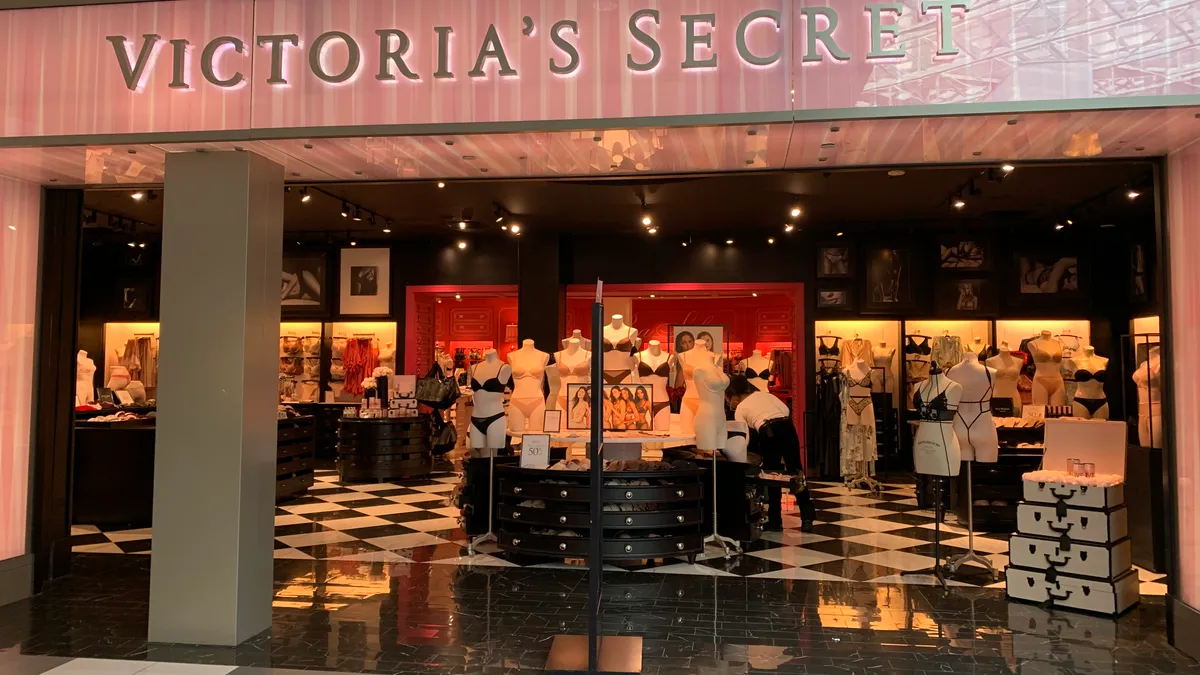Dive Brief:
-
L Brands on Wednesday reported that fourth quarter net sales rose 2.4% to $4.82 billion as comps rose 10% (up 22% at Bath & Body Works and down 3% at Victoria's Secret). E-commerce at Bath & Body Works rose 74% and at Victoria's Secret rose 33%, according to a company press release.
-
The company swung to black, reaching net income of $860.3 million compared to last year's $192.3 million net loss. Adjusted to exclude certain charges from 2019, operating income rose 58% to $1.27 billion; Bath & Body Works operating income rose by $250 million or 38%, to $913.7 million, while Victoria's Secret adjusted fourth quarter operating income rose by $209.8 million or 108% to $403.4 million.
-
The company continues to move away from enclosed malls, with plans to close another 30 to 50 Victoria's Secret stores in North America this year, according to an investor presentation. L Brands will also shift more Bath & Body Works stores to off-mall locations, where comps are double, conversion is higher and operating costs are lower, executives said on a Thursday conference call.
Dive Insight:
L Brands executives have changed their tune about lingerie.
Martin Waters, who took the CEO spot at Victoria's Secret earlier in February, told analysts that Victoria's Secret is now leaning into a brand repositioning "to make it more relevant, to make it more inclusive, to make it more consistent with the attitude and lifestyle of the modern woman."
"And so we've listened to her," he also said. "And we've carefully decided to make some change and that change is summarized by her asking us to move away from telling her what we think is sexy and what we think she should wear and how we think she should look to being there to help her craft the story that she wants to tell."
Sounding much like Victoria's Secret's critics have in recent years, Waters also said that failing to do that has allowed competitors to take share. The brand has begun to wrest that back and demonstrate renewed profit strength thanks largely to a 1,140 basis point gain in operating margin, which reached 19.2% in the quarter. Victoria's Secret was able to avoid promotional pricing thanks to merchandise improvements and better inventory control, the company said.
But both brands noted gross margin expansion and fewer promotions. For Bath & Body Works, it's a recognition of strength and for Victoria's Secret it's a recognition that driving sales that way dilutes profits, according to BMO Capital Markets Managing Director Simeon Siegel. Those Victoria's Secret advancements are "operating like clockwork," according to a Wednesday client note from BMO analysts.
"While [Victoria's Secret's] 4Q sales declined 15%, EBIT dollars more than doubled, and 'dollars per footstep' ... grew ~75%," Siegel said, noting that the pandemic year has introduced new metrics like "dollars per footstep" and "open-only comps," referencing stores that were actually running. "[W]e believed gross margin represented a material opportunity for improvement… and that's what has been transpiring."
Despite the recovery at Victoria's Secret, the company continues to work on separating the lingerie business from its Bath & Body Works unit, either by spinning it off into its own publicly traded company or selling it to a third party, executives said.
For the full year, company net sales fell 8.3% to $11.85 billion as comps rose 21%, with a 45% comps rise at Bath & Body Works and a 1% rise at Victoria's Secret. Full year e-commerce rose 109% at Bath & Body Works and 31% at Victoria's Secret. L Brands net income reached $844.5 million from last year's $366.4 million net loss.
















